Our History
Ras Morbat Eye Clinic – Established 1996
Yemenis serving Yemenis
The Ras Morbat Eye Clinic
Established in 1996 To Improve The Lives of All Yemenis
The Ras Morbat Clinic was established within the compound of the old Victorian Anglican Christ Church in Aden in 1996 to provide primary health care for mothers and babies. From the very beginning the partnership between the Anglican Diocese of Cyprus and the Gulf and the Ministry of Health in Aden has been a good example of compassion and care for people in need without regard to religious or tribal identities. Over the years the work expanded to include an emphasis on eye care and in 2014 when the Yemeni Government opened a small hospital about a half kilometre from Christ Church it was decided that the Ras Morbat Clinic should focus primarily on eye care that was not offered at the local government health clinic.
The Clinic is staffed entirely by Yemenis. Interestingly, all of the doctors are female. They provide a large spectrum of care, from general vision exams and prescriptions for lenses, to surgery for cataracts and other corrective procedures. Patients used to come mostly from the Tawahi area and are mostly older people. However, since the outbreak of civil war in 2015, the Ras Morbat Eye Clinic scope has broadened considerably. A steady stream of displaced people has come to Aden from villages far away and because they do not have local health cards they are not eligible to be treated in the local government clinics. People from all over Yemen are now coming to the Clinic for eye care.
In the past, the staff visited schools to offer vision exams and recommend prescriptions for spectacles if needed. For many years the staff have held outside ‘clinics’, offering treatment and surgery in areas quite remote from Aden, including Socotra, Mokha and the UNHCR camp for Somali refugees 200 km west of Aden. However, since the troubles began it has not been safe to travel out of Aden, especially with expensive medical equipment. Consequently, the UNHCR brings people from the refugee camp once per week for check-ups and treatment. Also, the Yemen Society for the Blind brings patients from their institutions weekly. Annually, medical students from the local university are assigned to serve internships at the Ras Morbat Eye Clinic under the guidance of the Clinic staff.
The staff are very dedicated and proud of their heritage of service to the people of Tawahi and the Aden area. The financial support from around the world that enables them to serve their fellow Muslims in Aden and the fact that the Clinic is located in the church compound gives them a sense of God’s blessing on their work. Indeed, during the worst of the recent violence in Aden there were many ‘gangs’ roaming the streets in the absence of civil authority. Some were simply interested in looting and others, more radicalised, took the opportunity to vandalise the three Roman Catholic churches in Aden. It was the people living in the area near Christ Church who protected the compound from vandals and radicals who repeatedly tried to attack the compound, proclaiming not only that the church represents a place of prayer, but also that there is a very strong sense of respect toward the staff of the Clinic among the people and the authorities in Aden.
In addition to simple vision exams, an average of 450 patients are treated for more serious conditions each month at the Ras Morbat Eye Clinic. Costs are kept as low as possible; cataract surgery is priced at US$75 to cover the provision of the consumables and intraocular lens implants. Special financial help is found for patients who cannot afford the treatment they need. The staff often voluntarily work on Fridays, their day off, to keep up with the patient load and offer treatment to those who travel great distances in the hope of regaining their sight. Because of the threat of kidnapping, it is currently quite dangerous for non-Yemeni specialists to visit and offer different kinds of training in specific surgical techniques, but we are grateful for the cooperation of doctors from commercial clinics who donate their time and Egyptian doctors who have visited more recently to offer specialised training.
During the worst of the fighting in 2015 the Clinic was closed for three months, mostly to avoid the possibility that a large gathering of people in one place might constitute a target for one of the fighting groups. Rather extensive damage to the building from nearby shelling was repaired as quickly as possible and in late August 2015 the Clinic was reopened. Immediately there was a daily additional intake of patients with war injuries to their eyes and heads in addition to the routine patients visits for normal eye treatment. The Ras Morbat Eye Clinic was one of the very few functioning medical facilities in Aden at the time and quickly a partnership with Médecins Sans Frontières was developed where their field hospital took in injured from all over the area, but referred all head wounds to the Ras Morbat Eye Clinic staff. This partnership continues today with very satisfactory results. Even now, patients with injuries from the continued fighting and accidents from formerly unexploded munitions are coming to the Clinic for treatment every week. These injuries have been quite challenging for the staff because of the great variety of treatments needed and emotionally stressful because of the significant numbers of children who were injured by mines.
Today there is a relative level of civil order in the city of Aden. Basic infrastructure for water and electricity, roads and public transport (Adeni style) are more or less back to the standard before the recent fighting. While the importation/supply of food is a major concern with the disrupted shipping industry, supplies of medicines and surgical implements is sporadic. Water supply is now regular, but not continuous. Electricity is available 2 hours on – 4 hours off, but the Clinic has a generator to supply electricity when power is lost, especially during surgical sessions. Thankfully, the supply of diesel in Aden has been largely restored and it is no longer necessary to struggle with the black market to keep the generator going.
All of these factors are essential for the smooth running of the Clinic, but in the larger context these concerns reach back to the urgent need for peace, resolution of the conflict and the restoration of normality throughout Yemen. We are very proud that the Ras Morbat Eye Clinic has continued to function normally in spite of all of the difficulties and we are anxious for the dismantled government health services of Yemen to be restored to meet the medical needs of thousands and thousands of Yemeni people.
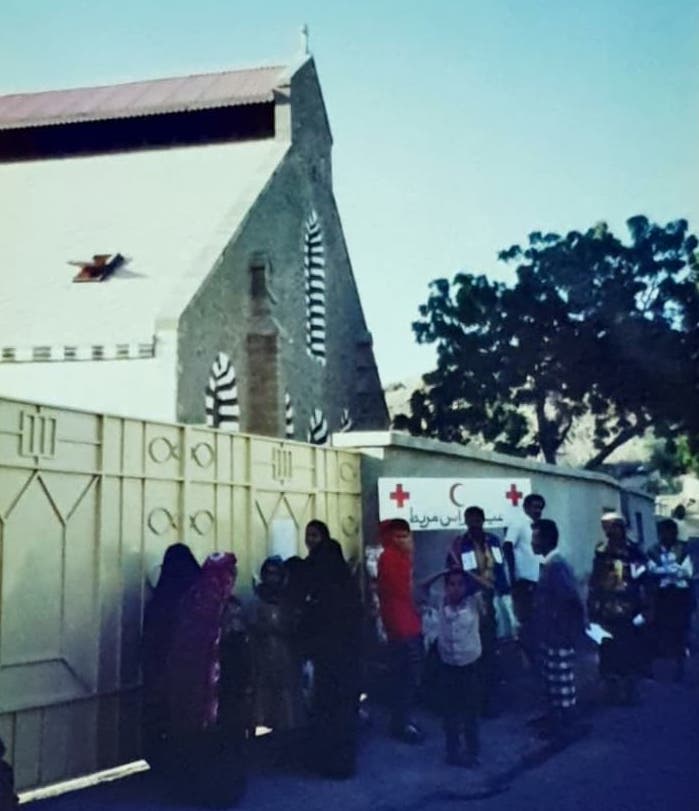
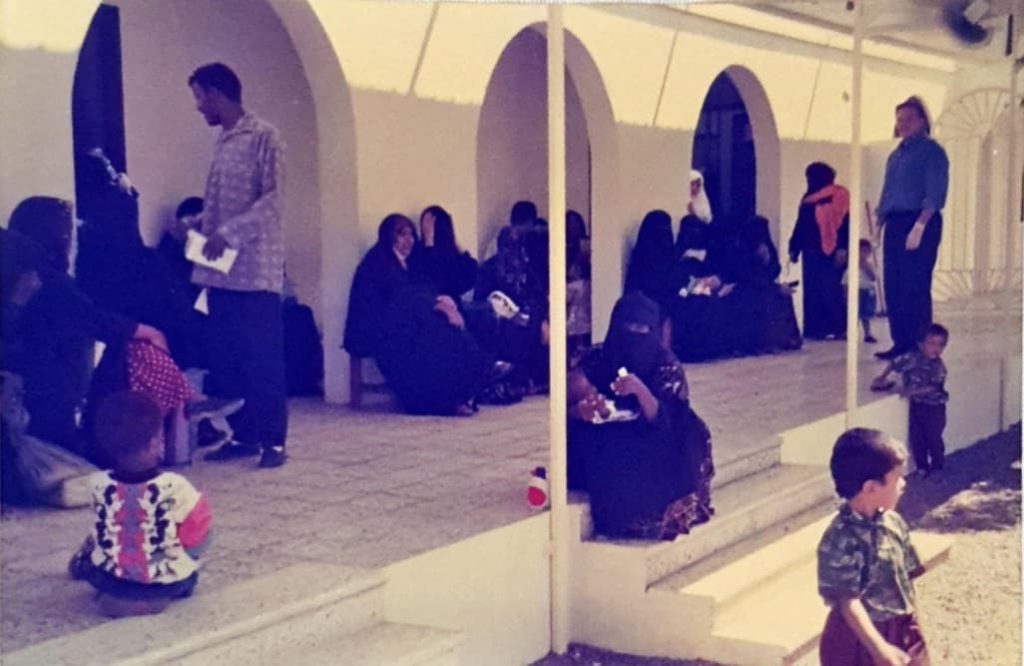


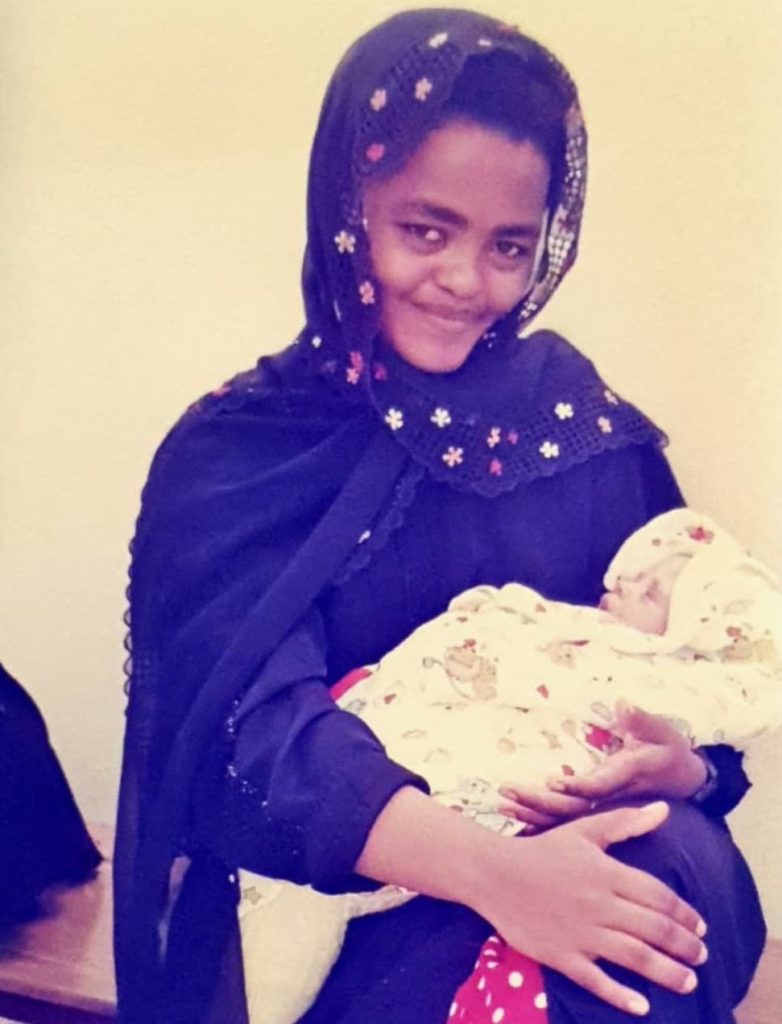


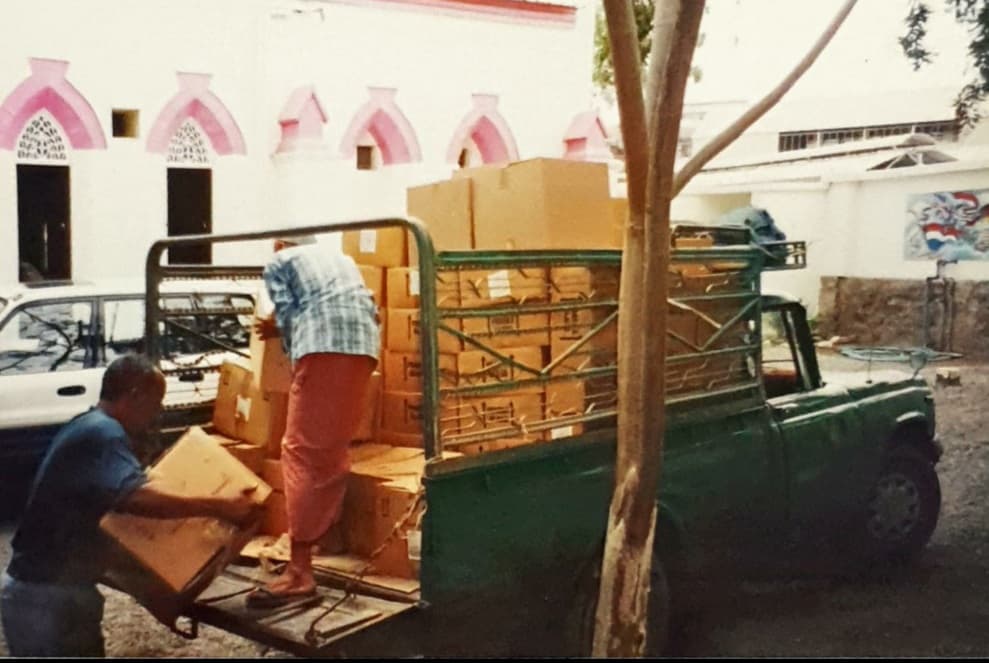


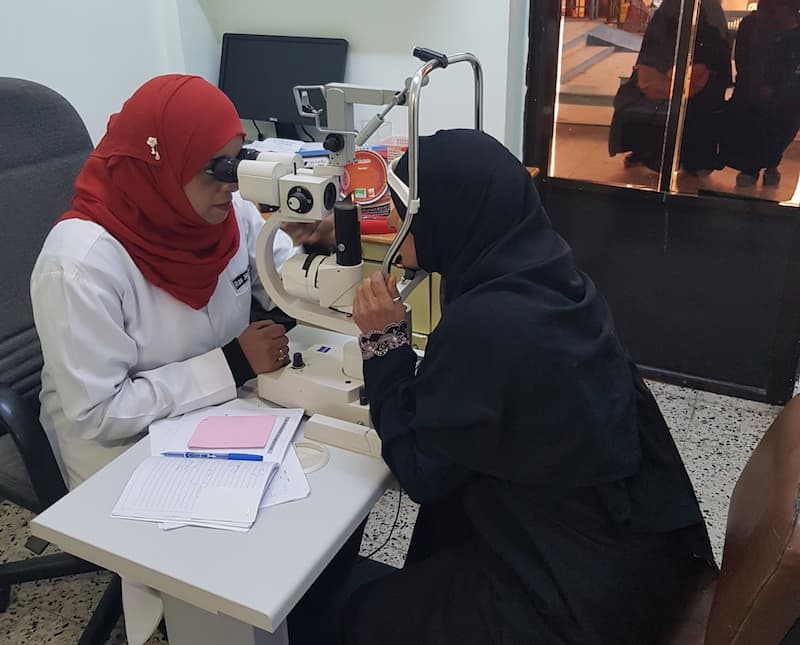


The Ras Morbat Clinic was established within the compound of the old Victorian Anglican Christ Church in Aden in 1996 to provide primary health care for mothers and babies. From the very beginning the partnership between the Anglican Diocese of Cyprus and the Gulf and the Ministry of Health in Aden has been a good example of compassion and care for people in need without regard to religious or tribal identities. Over the years the work expanded to include an emphasis on eye care and in 2014 when the Yemeni Government opened a small hospital about a half kilometre from Christ Church it was decided that the Ras Morbat Clinic should focus primarily on eye care that was not offered at the local government health clinic.



The Clinic is staffed entirely by Yemenis. Interestingly, all of the doctors are female. They provide a large spectrum of care, from general vision exams and prescriptions for lenses, to surgery for cataracts and other corrective procedures. Patients used to come mostly from the Tawahi area and are mostly older people. However, since the outbreak of civil war in 2015, the Ras Morbat Eye Clinic scope has broadened considerably. A steady stream of displaced people has come to Aden from villages far away and because they do not have local health cards they are not eligible to be treated in the local government clinics. People from all over Yemen are now coming to the Clinic for eye care.
In the past, the staff visited schools to offer vision exams and recommend prescriptions for spectacles if needed. For many years the staff have held outside ‘clinics’, offering treatment and surgery in areas quite remote from Aden, including Socotra, Mokha and the UNHCR camp for Somali refugees 200 km west of Aden. However, since the troubles began it has not been safe to travel out of Aden, especially with expensive medical equipment. Consequently, the UNHCR brings people from the refugee camp once per week for check-ups and treatment. Also, the Yemen Society for the Blind brings patients from their institutions weekly. Annually, medical students from the local university are assigned to serve internships at the Ras Morbat Eye Clinic under the guidance of the Clinic staff.



The staff are very dedicated and proud of their heritage of service to the people of Tawahi and the Aden area. The financial support from around the world that enables them to serve their fellow Muslims in Aden and the fact that the Clinic is located in the church compound gives them a sense of God’s blessing on their work. Indeed, during the worst of the recent violence in Aden there were many ‘gangs’ roaming the streets in the absence of civil authority. Some were simply interested in looting and others, more radicalised, took the opportunity to vandalise the three Roman Catholic churches in Aden. It was the people living in the area near Christ Church who protected the compound from vandals and radicals who repeatedly tried to attack the compound, proclaiming not only that the church represents a place of prayer, but also that there is a very strong sense of respect toward the staff of the Clinic among the people and the authorities in Aden.



In addition to simple vision exams, an average of 450 patients are treated for more serious conditions each month at the Ras Morbat Eye Clinic. Costs are kept as low as possible; cataract surgery is priced at US$75 to cover the provision of the consumables and intraocular lens implants. Special financial help is found for patients who cannot afford the treatment they need. The staff often voluntarily work on Fridays, their day off, to keep up with the patient load and offer treatment to those who travel great distances in the hope of regaining their sight. Because of the threat of kidnapping, it is currently quite dangerous for non-Yemeni specialists to visit and offer different kinds of training in specific surgical techniques, but we are grateful for the cooperation of doctors from commercial clinics who donate their time and Egyptian doctors who have visited more recently to offer specialised training.



During the worst of the fighting in 2015 the Clinic was closed for three months, mostly to avoid the possibility that a large gathering of people in one place might constitute a target for one of the fighting groups. Rather extensive damage to the building from nearby shelling was repaired as quickly as possible and in late August 2015 the Clinic was reopened. Immediately there was a daily additional intake of patients with war injuries to their eyes and heads in addition to the routine patients visits for normal eye treatment. The Ras Morbat Eye Clinic was one of the very few functioning medical facilities in Aden at the time and quickly a partnership with Médecins Sans Frontières was developed where their field hospital took in injured from all over the area, but referred all head wounds to the Ras Morbat Eye Clinic staff. This partnership continues today with very satisfactory results. Even now, patients with injuries from the continued fighting and accidents from formerly unexploded munitions are coming to the Clinic for treatment every week. These injuries have been quite challenging for the staff because of the great variety of treatments needed and emotionally stressful because of the significant numbers of children who were injured by mines.



Today there is a relative level of civil order in the city of Aden. Basic infrastructure for water and electricity, roads and public transport (Adeni style) are more or less back to the standard before the recent fighting. While the importation/supply of food is a major concern with the disrupted shipping industry, supplies of medicines and surgical implements is sporadic. Water supply is now regular, but not continuous. Electricity is available 2 hours on – 4 hours off, but the Clinic has a generator to supply electricity when power is lost, especially during surgical sessions. Thankfully, the supply of diesel in Aden has been largely restored and it is no longer necessary to struggle with the black market to keep the generator going.
All of these factors are essential for the smooth running of the Clinic, but in the larger context these concerns reach back to the urgent need for peace, resolution of the conflict and the restoration of normality throughout Yemen. We are very proud that the Ras Morbat Eye Clinic has continued to function normally in spite of all of the difficulties and we are anxious for the dismantled government health services of Yemen to be restored to meet the medical needs of thousands and thousands of Yemeni people.
no one becomes poor by giving
The Eye Clinic is supported almost entirely by donations.
Give the gift of sight to many by giving today.